
Welcome to Screen Gems, our weekend dive into queer and queer-adjacent titles of the past that deserve a watch or a re-watch.
The Required: Stonewall Uprising
With pride month on the wane, and with discussion of police brutality continuing to capture headlines, all LGBTQ people should revisit a defining chapter in the history of queer people, and in America. Stonewall Uprising, as the name implies, retells the events of the famed riots that kicked-off the modern-day queer rights movement with towering authority. Co-directors David Heilbroner & Kate Davis interview actual survivors of the riots who recount their own actions the night of June 28, 1969, and conjure images of a community in righteous revolt. Though other riots and protests in favor of queer rights had happened before, the night of the Stonewall Uprising galvanized the community in a way that it never before had. The line had been drawn, and our people said “No more.”
Beyond recalling the state of LGBTQ culture in the lead-up to the protests, Stonewall Uprising pays homage to other major protests by LGBTQ people against police harassment. The film also dispels some of the myths surrounding the riots themselves. Contrary to popular myth, Marsha P. Johnson and Sylvia Rivera did not start the riots, nor did Judy Garland’s death ignite the protests, nor were the crowds composed solely of white folks, men, people of color, women, transpeople, drag queens, upper class or poor people. The beauty of the Stonewall Inn, as with New York’s East Village at the time, was that it catered to all people of the LGBTQ community–a sort of United Nations for every letter of the spectrum. We have a feeling that’s why that fateful night in 1969 marked a turning point: queer people had finally become a community.
The story of Stonewall is that of a community finding itself–of uniting against oppression, of establishing steps toward justice and of learning to love itself. Pride honors not just the active community today, but both those that have come before us to pave the road toward equality, and those who still walk the path. Stonewall Uprising should be required viewing for any member of the LGBTQ crowd, for anyone interested in American Civil Rights, and anyone who wants to see the American promise of a More Perfect Union fulfilled.
How about we take this to the next level?
Our newsletter is like a refreshing cocktail (or mocktail) of LGBTQ+ entertainment and pop culture, served up with a side of eye-candy.
Streams on Amazon, YouTube, Kanopy & PBS.org.
Note: this article contains portions of other articles published previously here on Queerty.
This article includes links that may result in a small affiliate share for purchased products, which helps support independent LGBTQ+ media.



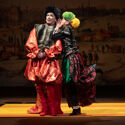



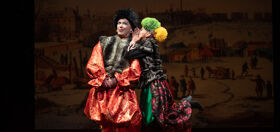

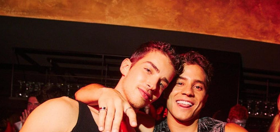
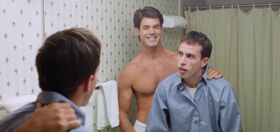
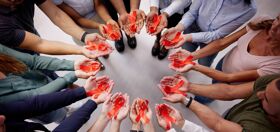

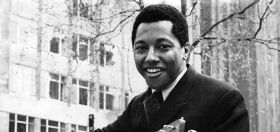




LumpyPillows
Pride was a protest; times change. Article is actually pretty factual. I’ll check the film out.
kevininbuffalo
“…nor were the crowds composed solely of white folks, men, people of color, women, transpeople, drag queens, upper class or poor people.” Odd phrasing, that’s pretty much everybody, isn’t it?
DennisMpls
I don’t think that’s odd phrasing at all. When I was a kid the impression often given was that the crowd was essentially white gay men. Later, others asserted it was dominated by trans people. I’ve seen others say it was mostly drag queens. The phrasing used in this story was totally intentional, to make the point that the uprising included “pretty much everybody.” I’ve always seen the incident as incredibly powerful, and ultimately transformative, and it makes it even more so to stress the wide variety of people involved.
storm45701
The narrative has tried to either be co-opted or shortchanged by many; was it this group or that group, this person or that one? In truth, it was everyone; gay protest became solidified and collective at that moment.
inbama
Paragraph 2, Sentence 3 – First time I’ve seen the truth in print on any LGBTQ+ website or periodical. Was it a slip-up or are the powers that be worried that American LGBs are going to walk away on our own like the Brits?
Jim
What is sad is that so few realize that Stonewall was actually just one step to equality.
The fight, we continue, started with a government astronomer named Frank Kameny in the 40’s!
TomH
Stonewall is in the West Village not the East Village. I was confused by the East Village reference. But I’d love to know what the East Village was like in 1969 — must have been pretty amazing.
GreekKeys
Stonewall is a legend, and the mythology keeps evolving. Back then, all the gay bars in New York were owned by the Mafia. In 1966, ‘Fat Tony’ Lauria of the Genovese crime family purchased Stonewall, then an unassuming family-friendly restaurant, and converted it into a festering dump for gays. The toilets constantly overflowed. There were no fire exits and no soap to wash the glasses. The liquor was watered down and stolen. Employees trafficked prostitutes, and dabbled in blackmailing patrons with threats to ‘out’ them. The cops constantly raided Stonewall and other mob-owned businesses in the area but, because the mob paid off the police, the cops usually gave warnings or came in the middle of the afternoon when no one was there. It’s unknown whether on that fateful night in 1969 the cops were cracking down on the mob, or on corruption in their own ranks, or if the owners of Stonewall simply didn’t get the tip-off in time. What is clear is that Stonewall was not targeted simply because gays hung out there.
JromeGervais09
Why are you all bickering and bitching about an era that all or most of you were not even alive when Stonewall Inn happened. I was. I was 23, in the Army and in Panama in 1969. We watched this on the AFSN and cheered. It was a protest that turned into a riot. Bless there gay hearts for doing so. It may not have been the first time a gay person spoke out to authorities, but society was ready by 1969 to listen. I came home in November of 1969 as a openly gay man. Everyone in the Army knew I was gay, didn’t matter to them, because in the Medical Corp there were thousands of us. Stonewall is important because of the time this protest happened that made a huge impact on America. The Black community came to the protest to and endangered there lives too. The Black Panthers were there too. I marched many times in NAACP protests with gay black men that I knew. If your arguments are about size, then just flop them on the table and get over your young selves.